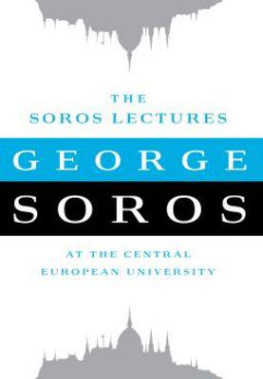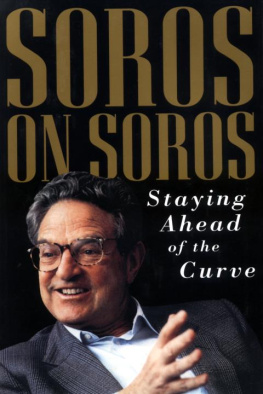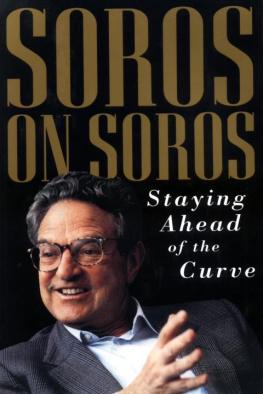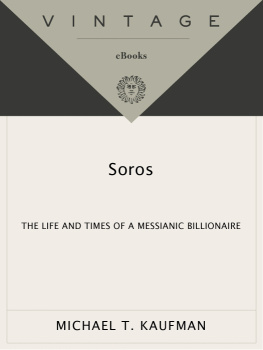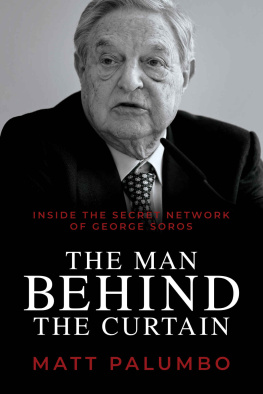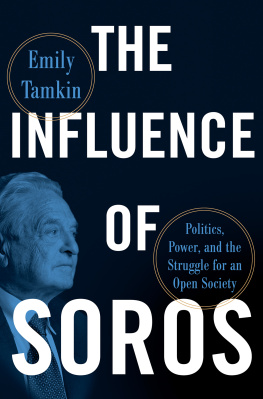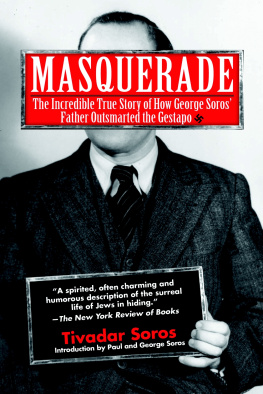Table of Contents
AUTHORS NOTE
I N OCTOBER 2009, I delivered this series of lectures in Budapest under the auspices of the Central European University, an international postgraduate institution in the field of humanities and social sciences that I established after the collapse of the Soviet system in 1991.
Lectures One and Two summarize a lifetime of experience and reflection. I lay out in detail the conceptual framework that has guided me in business and philanthropy and apply it to the current turmoil in financial markets. Lectures Three and Four explore what is, for me, newer groundquestions of ethical values and political power and the relationship between the two. The final lecture presents such predictions and prescriptions as my conceptual framework allows.
My goal is ambitious. It is that this conceptual framework should provide the foundation for a better understanding of human affairs. The reader will judge whether I have been successful. I hope that my ideas will be received in the same spirit of critical thinking in which they are offered and not as some sort of dogma.
These lectures and the discussions that followed were videoconferenced to universities around the world. The recordings are available at the website of the Open Society Institute, www.soros.org/resources/multimedia/sorosceu_20091112.
One of the discussion partners was Fudan University, Shanghai, and another partner was Hong Kong University. I am very pleased about that because I believe China will become increasingly influential in the world, and if my conceptual framework finds a following in China, the world might be a better place. Other partners included Columbia University; the London School of Economics, my alma mater ; and the Massachusetts Institute of Technology. I was pleased to be able to share my ideas at these distinguished institutions.
I am grateful to those at the Central European University and the Open Society Institute, and to my personal staff who helped make the original presentation and videocasting of these five lectures a success. My thanks also go to my publisher, Peter Osnos, and his colleagues at PublicAffairs. I owe a debt of gratitude to Colin McGinn and Mark Notturno for clarifying certain philosophical points; to John Shattuck, the president of the Central European University; to Anatole Kaletsky, Ivan Krastev, Mark Danner, and Howard Davies for moderating the discussions that followed each lecture; and to Cristovam Buarque and the many others who offered their comments.
GEORGE SOROS
January 2010
New York
LECTURE ONE
THE HUMAN UNCERTAINTY PRINCIPLE
Central European University Lecture Series,
October 26-30, 2009
I N THE COURSE OF MY LIFE I have developed a conceptual framework that has helped me to make money as a hedge fund manager and also to spend money as a policy-oriented philanthropist. But the conceptual framework itself is not about moneyit is about the relationship between thinking and reality, a subject that has been extensively studied by philosophers from early on. I started developing my philosophy as a student at the London School of Economics in the late 1950s. I took my final exams one year early, so I had a year to fill before I was qualified to receive my degree. I could choose my tutor, and I chose Karl Popper, the Viennese-born philosopher whose book The Open Society and Its Enemies had made a profound impression on me.
In his books Popper argued that the empirical truth cannot be known with absolute certainty. Even scientific laws cant be verified beyond a shadow of a doubt: they can only be falsified by testing. One failed test is enough to falsify, but no amount of conforming instances is sufficient to verify. Scientific laws are hypothetical in character and their truth remains open to falsification. Ideologies that claim to be in possession of the ultimate truth are making a false claim; therefore, they can be imposed on society only by compulsion. All such ideologies lead to repression. Popper proposed a more attractive form of social organization: an open society in which people are free to hold divergent opinions and the rule of law allows people with different views and interests to live together in peace. Having lived through both German and Russian occupation here in Hungary, I found the idea of an open society immensely attractive.
While I was reading Popper I was also studying economic theory, and I was struck by the contradiction between Poppers emphasis on imperfect understanding and the theory of perfect competition in economics, which postulated perfect knowledge. This led me to start questioning the assumptions of economic theory. These were the two major theoretical inspirations of my philosophy. There were, of course, many other minor ones.
My philosophy is also deeply rooted in my personal history. The formative experience of my life was the German occupation of Hungary in 1944, when I was not yet fourteen years old. I came from a reasonably well-to-do middle-class background, and I was suddenly confronted with the prospect of being deported and killed just because I was Jewish. Fortunately, my father was well prepared for this far-from-equilibrium experience. He had lived through the Russian Revolutionthe formative experience of his life. Until then he had been an ambitious young man. When the First World War broke out, he volunteered to serve in the Austro-Hungarian Army. He was captured by the Russians and taken as a prisoner of war to Siberia. Being ambitious, he became the editor of a newspaper produced by the prisoners. It was handwritten and displayed on a plank, and it was called The Plank . This made him so popular that he was elected the prisoners representative.
Then some soldiers escaped from a neighboring camp, and their prisoners representative was shot in retaliation. My father, instead of waiting for the same thing to happen in his camp, organized a group and led a breakout. His plan was to build a raft and sail down to the ocean, but his knowledge of geography was deficient; he did not know that all the rivers in Siberia flow into the Arctic Sea. They drifted for several weeks before they realized that they were heading for the Arctic, and it took them several more months to make their way back to civilization across the taiga. In the meantime, the Russian Revolution broke out, and they became caught up in it. Only after a variety of adventures did my father manage to find his way back to Hungary; had he remained in the camp, he would have arrived home much sooner.
My father came home a changed man. His experiences during the Russian Revolution profoundly affected him. He lost his ambition and wanted nothing more from life than to enjoy it. He imparted to his children values that were very different from those of the milieu in which we lived. He had no desire to amass wealth or become socially prominent. On the contrary, he worked only as much as was necessary to make ends meet. I remember being sent to his main client to borrow some money before we went on a ski vacation. My father was grouchy for weeks afterward because he had to work to pay it back. Although we were reasonably prosperous, we were not the typical bourgeois family, and we were proud of being different.
In 1944, when the Germans occupied Hungary, my father immediately realized that these were not normal times and that the normal rules didnt apply. He arranged false identities for his family and a number of other people. Those who could, paid; others, he helped for free. Most of them survived. That was his finest hour. Living with a false identity turned out to be a very positive experience for me. With the rest of my family, I was in mortal danger. People perished all around us, but we managed not only to survive but also to help other people. We were on the side of the angels, and we triumphed against overwhelming odds. This made me feel very special. It was high adventure. I had a reliable guide in my father, and I came through unscathed. What more could a fourteen-year-old ask for?

